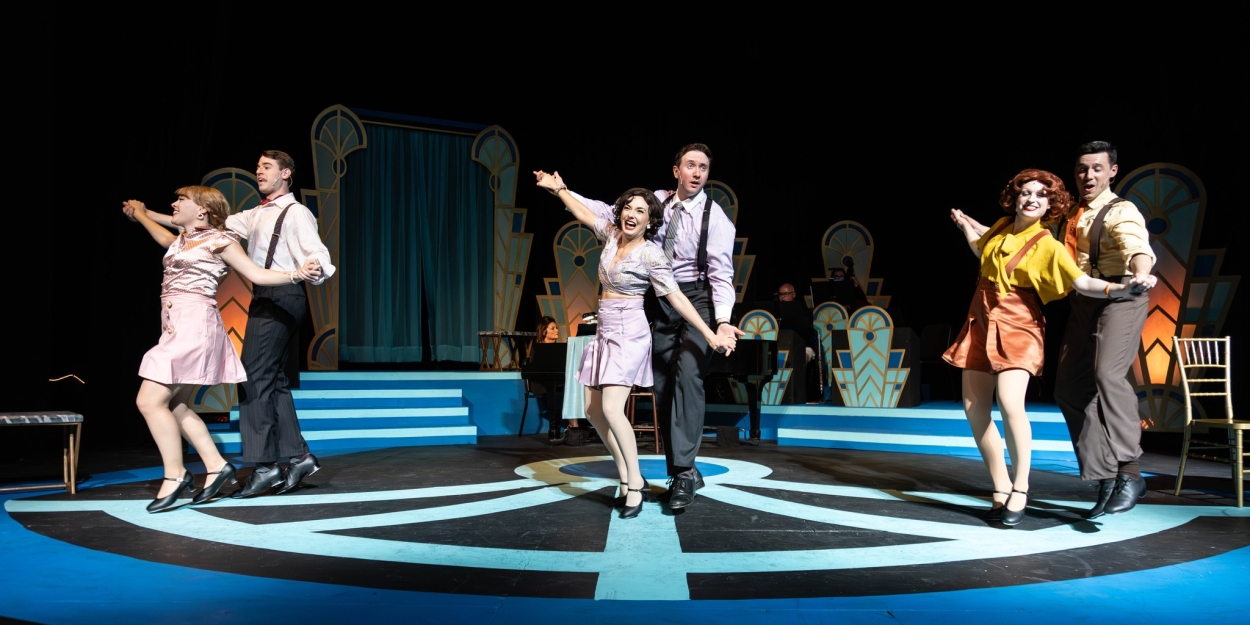Review: CHEEK TO CHEEK Is Sincerely Old-Fashioned at Saint Vincent Summer Theatre
Saint Vincent Summer Theatre closes its stock season with an Irving Berlin revue.

It's amazing to think of how good, and how prolific, the legendary songwriter Irving Berlin really was. A revue like Cheek to Cheek: Irving Berlin in Hollywood is clearly designed around the licensing limitations that prevented it from using Berlin's twenty or so most famous songs. This is unapologetically the Berlin B-sides, but... when your B-sides include "Blue Skies," "God Bless America," "Count Your Blessings Instead of Sheep" and the titular "Cheek to Cheek," nobody is going to be waiting with bated breath for "Puttin' on the Ritz." (Besides, a different show is currently using THAT song at the Pittsburgh CLO Cabaret... more on that later this week.) There is, quite simply, no beating Irving Berlin as the king of American popular song, and this simple but effective revue proves it in spades.
Sung, danced and narrated by a cast of six triple threats, Cheek to Cheek tells the story, documentary style, of Irving Berlin's love hate relationship with Hollywood. There are no characters per se, though Cody Cooley intermittently stands in as Berlin and Anthony J. Massetto as Berlin's famous film collaborator Fred Astaire. Instead, we get a series of songs, dances and narrative tidbits from the 1930s to Berlin's death. This guides us through a series of musical styles from Latin dance to jazz to operetta, into Berlin's later, and most musically ambitious, ballads.
The word for this show's style is "sincere." There's nary a wink, not a dash of camp or self-awareness; in fact, it's presented with almost reverence, even when Berlin's songs are on the weak side. (Act 1 delves into Berlin's serious of novelty dance-craze songs like "The Yam," which is a novelty that doesn't seem to know it's a novelty.) The only hints of edge are in moments quoting from Irving Berlin himself, who loved to spike his more sentimental revues with a lick of bawdy, vaudeville-style humor. Instead, this revue leans towards Berlin's classy, glamorous and always sentimental side, costumed by Beth Shari and set designed by Karen A. Glass in high art-deco continental. Director Greggory Brandt and choreographer Nicole Rae Jones lean hard into that "floor show at the Trocadero" vibe, with tap numbers, tangos and charming musical stagings aplenty.
In lieu of a leading man, Cody Cooley steps in and out of the ensemble as Irving Berlin. In keeping with the somewhat serious, high-minded tone of the evening, Cooley plays him with a quiet, almost brooding thoughfulness, more Jay Gatsby in horn-rimmed glasses than a theatrical cliche of "the brilliant, madcap songwriter." Mickey Orange is our song-and-dance man, gifted with fleet feet and a way around that warm, old-timey vibrato sound that makes him as effective a balladeer as a tap dancer. Anthomy J. Massetto, towering over the rest of the cast and with a deep, operatic bass voice to boot, sells his novelty songs as well as his arias; his comic dance routine in Act 2 with bongos on his hips is a rare comic highlight in the sentimental show. (Side note: all operatic basses over six feet tall eventually have to play Lurch in The Addams Family- it's the law- so I certainly see a pair of platform Frankenstein shoes in Massetto's future.)
The women of the cast don't get the same opportunity to assume historic figures as the men, instead acting more as narrators and "Hollywood executive" stand-ins. Sarah Chelli, a comedienne of some note in Saint Vincent seasons past, gets a more dramatic turn here; she works her mezzo-soprano voice to great effect in both its soprano and its mezzo ranges here across a wide variety of songs. Brittney Leigh Morton, a new Saint Vincent face, features extremely notably across a number of dances, and Sarah Hennesy, a Saint Vincent Summer Theatre alum, pops the most of all the narrators with her sharp-as-a-pin comic timing.
On one hand, it would be easy to say Irving Berlin's brand of "high society" music is outdated: do we even HAVE a high society anymore, and do they have any interest in foxtrots if they exist? On the other hand, I can't imagine a world where Berlin's songs aren't heard constantly, almost part of the folkore (they're only a few years away from joining the public domain). Many of these songs remind me not of themselves, but of memorable moments in popular culture: "Cheek to Cheek" from The Simpsons, and so forth. Shows like this do their part to keep a living legend alive, just as their entertainment and audience appeal keeps Saint Vincent alive too. Here's hoping for many more years of both of them.
Reader Reviews

Videos

